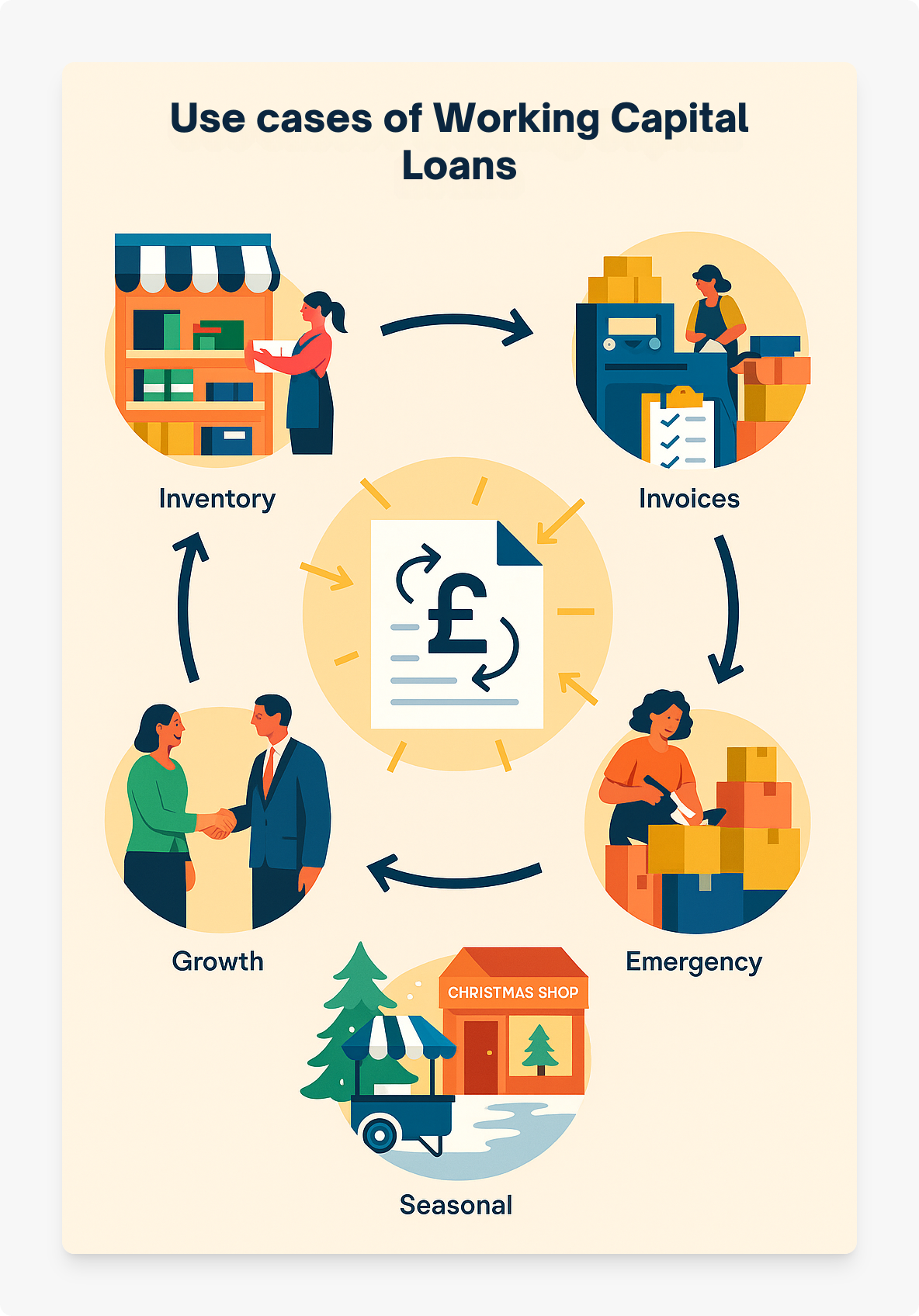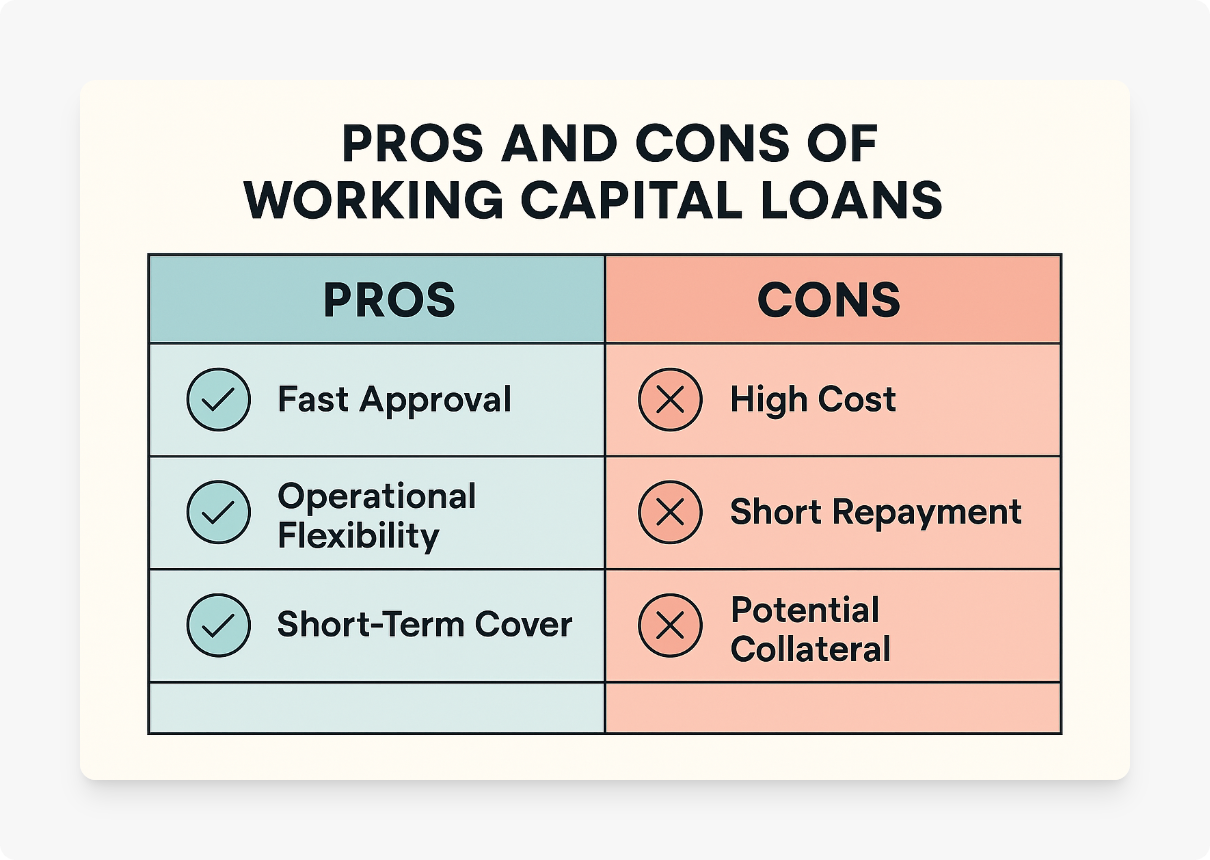

What Is a Working Capital Loan?

A working capital loan is a type of short-term business financing. It helps companies pay for daily operating costs like payroll, rent, utilities, and inventory. This loan is not for buying property or long-term assets. It’s about keeping your business running day to day.
When Should You Use a Working Capital Loan?
Working capital loans are flexible. Here are some smart times to use one:
- Slow seasons: Bridge cash flow gaps when sales are down.
- Project kickoffs: Cover upfront costs before client payment rolls in.
- Bulk buying: Take advantage of supplier discounts.
- Emergency repairs: Keep operations going without disruption.
These loans give you breathing room when revenue is delayed or expenses spike.

How Working Capital Loans Work
Most working capital loans come as a lump sum or a revolving credit line. You’ll typically get approved in a few days, especially with fintech lenders. Repayment terms are short—anywhere from a few weeks to 12 months.
You might pay back:
- In fixed monthly or weekly instalments
- Through flexible drawdowns, similar to a credit card
- Using daily sales deductions, common with merchant cash advances
This flexibility makes them ideal for covering ongoing costs without long-term debt.
What Are the Pros and Cons?

Pros
- Fast approval: Funds can hit your account in as little as 24 hours.
- Simple usage: No restrictions on how you apply the funds operationally.
- No long-term burden: Great for businesses that expect revenue to pick up soon.
Cons
- High cost: Interest rates and fees can be steep compared to traditional loans. See our breakdown of merchant cash advance pros and cons.
- Short terms: You need a solid repayment plan to avoid cash flow stress.
- Collateral may be required: Especially for newer or low-credit businesses.
What Do Lenders Look For?
To get approved, most working capital lenders want to see:
- At least 6–12 months of trading history
- Proof of stable cash flow, usually over £50k–£100k per year
- Basic financial documents like bank statements and profit & loss reports
- A fair-to-good credit score or a personal guarantee
Need help pulling this together? Use our funding tools or contact our team.
What Should You Avoid Using It For?
Working capital loans are for everyday operations—not long-term growth or personal use. Avoid using them to:
- Buy property or heavy equipment
- Fund expansion or M&A activity
- Cover personal expenses or unrelated debts
If you need help picking the right product, explore other financing options.
How Fast Can You Get Funded?
Online lenders like iwoca, PayPal, and others can approve and fund working capital loans in under 48 hours. Traditional lenders may take several days to a few weeks, depending on their process.
If speed matters, compare top UK short-term providers in our guide: Top Short-Term Business Loan Providers.
Explore Other Short-Term Finance Options
Not sure if a working capital loan is the right fit? There are other short-term funding options that might suit your needs better depending on your cash flow cycle, business model, and repayment preference.
- Merchant Cash Advance (MCA): Best for businesses with strong daily sales. An MCA provides a lump sum in exchange for a percentage of future card takings. Repayment adjusts with your revenue—ideal if income fluctuates.
- Invoice Finance: If unpaid invoices are tying up your cash, this option lets you unlock funds based on outstanding customer invoices. It’s popular with B2B firms who invoice on net terms but need cash sooner. Learn more at money.co.uk.
- Revolving Credit: Like a credit card for your business. Draw what you need, repay, and reuse the facility. It offers more flexibility than fixed-term loans and suits businesses with unpredictable expenses. See a full breakdown here.
For a side-by-side comparison of providers, visit our Top Short-Term Business Loan Providers guide.
Final Thoughts + Next Steps
A working capital loan can be the difference between missing payroll and staying fully operational. But like any funding, it needs careful planning. Know your numbers, compare your options, and read the terms.
Want tailored advice? Try our loan calculator or contact our team to get started today.
.png)

